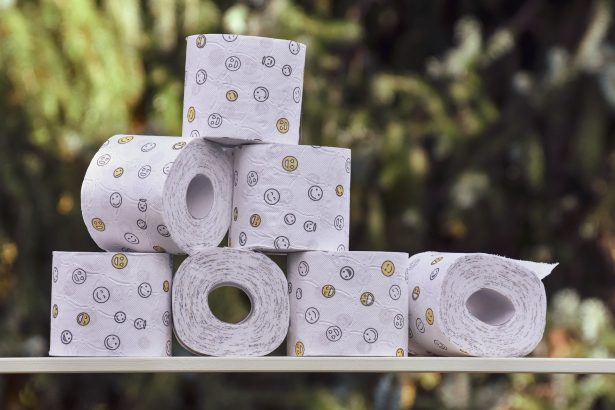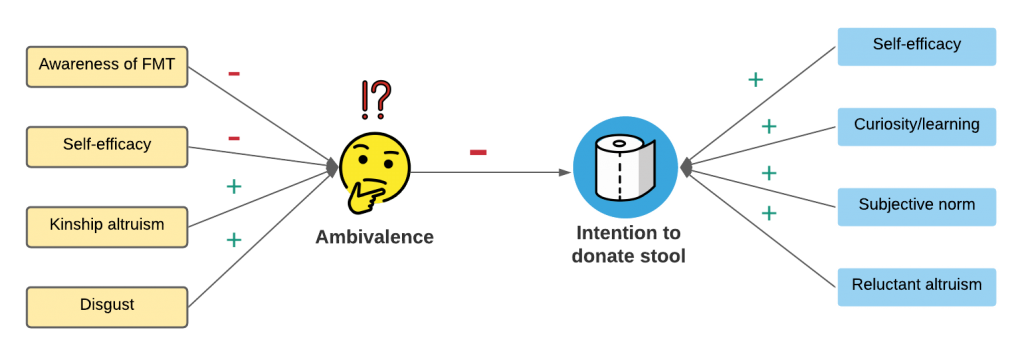You want me to donate what??
Poo: The other way to save lives


By Mel Hyde and Barbara Masser
You are no doubt familiar with the generosity of Australians in helping their neighbours and community in times of need such as during the devastating 2019-2020 bushfires. You may also know that in the last year Australians rolled up their sleeves to make 1.5 million blood donations, over 221 thousand registered on the Australian Organ Donor Register, and over 5 thousand swabbed to see if they are a match for someone with blood cancer who needs a life-saving stem cell transplant.
You may not know about or have ever considered another type of donation that can improve or save the lives of thousands of Australians who have recurrent C. difficile infection. Stool donation. No – we don’t mean an item of furniture found in a kitchen or bar. We’re talking about poo. Poo from a healthy donor, that is screened and processed, and used for faecal microbiota transplants for Australians who would benefit from this treatment.
Would Australians really do that? The short answer is yes, some Australians would and they already have! Earlier this year the Australian Red Cross Lifeblood Microbiome pilot program began in Western Australia. This program recruited donors to supply Fiona Stanley Hospital with faecal microbiota transplants to treat patients with life-threatening recurrent C. difficile infection.
While the results of the pilot program are not yet available, any future expansion of this program will mean more Australians will be needed to donate. Blood donors tend to be healthier than non-donors, and so they make an ideal group to recruit from. Of course, they need to meet strict screening criteria, but we know they donate blood because they want to help others (i.e., altruism). So, we might also assume that blood donors would want to donate stool. However, perhaps this is a crappy assumption. Whether blood donors also want to donate stool is not yet clear.
Certainly, 88% of Danish blood donors approached about stool donation consented to the screening and testing process leading up to donation. Yet, of those who declined, half did so because stool donation was unappealing. These mixed feelings, with being motivated to help on the one hand, and also believing stool donation is unpleasant, there is a social stigma around it, and the logistics of donation are challenging, were similarly reported in a Canadian study of community members. For blood collection agencies and (potential) donors, ambivalence is not ideal. In research on blood and bone marrow donors, ambivalence has been linked to lower commitment, higher attrition, and poorer physical and psychological outcomes after donation.
What about Australians? Do they have mixed feelings (i.e., ambivalence) about donating, and if so, how much does this ambivalence impact their decisions to donate? In our study published in Transfusion this month, we surveyed 382 Australians who believed themselves eligible to donate blood and met broad screening criteria for stool donation (e.g., in good health, “normal” body mass index, not taking medication, no chronic digestive disorder or condition, aged between ≥18 and ≤50 years) to get some answers. We presented information about C. difficile infection, faecal microbiota transplantation, and the stool donation process. We then asked these eligible blood donors about their attitudes toward stool donation, what others think about stool donation (perceived social norms), how easy or difficult it would be to donate (self-efficacy), their reasons for donating (motives), how disgusted they felt about the idea of donating, their willingness to receive a faecal microbiota transplant if needed, how likely they were to donate (intention), and their ambivalence (indecision, mixed feelings) about donating stool.
Here is what we found out –
Are Australians eligible to donate blood ambivalent about stool donation? Yes, ambivalence was common. In our study most were ambivalent about donating – 89% had some ambivalence, with a further 5% being highly ambivalent. Only 6% reported no ambivalence about donating.
What contributes to this ambivalence? In our study, not knowing about faecal microbiota transplantation, not feeling confident to donate, being motivated to donate to ensure stool is available for loved ones if they need it (kinship altruism), and being disgusted by stool donation all contributed to feelings of ambivalence.
Does ambivalence make stool donation less likely? Yes, ambivalence decreased donation intentions. In our study , having less ambivalence along with other factors such as increased self-efficacy, being motivated to donate due to curiosity or wanting to learn more, perceiving social support for donation, and being motivated to donate due to the belief that nobody else will (reluctant altruism) all contributed to intentions to donate stool.
What can blood collection agencies do if they plan to ask blood donors to also consider donating stool? Since ambivalence towards stool donation appears relatively common amongst eligible blood donors, blood collection agencies should consider doing the following:
- Raising awareness about stool donation and educating blood donors before asking them to donate stool. This approach will give donors time to overcome their initial reactions such as disgust to stool donation.
- Giving clear guidance about the requirements of donating (e.g. a donor journey map outlining testing requirements and donation schedule) and providing donors with a ‘cooling-off’ period to consider the information. This approach may help to save costs on screening.
- Implementing processes that build (potential) donors’ confidence so that concerns are resolved early and potential donors have a realistic preview of what donation involves. A video showing the donation centre, and including donor experiences about what is easy and challenging may help build confidence.
- Screening potential donors early for ambivalence and disgust so that potential donors can be supported in their decision-making about stool donation. This approach may help to ensure potential donors feel comfortable and confident in their decisions to help others.
While Australians have no problem with stockpiling toilet paper, they appear less keen about the idea of donating stool. This is likely due to many being unfamiliar with why stool donation is needed or what it entails. Our study suggests that a number one priority for blood collection agencies is to resolve these knowledge gaps. In turn, this will help eligible blood donors to feel more confident to get down to business and give their number twos to save the lives of thousands of Australians who need it.


I have a hard time describing my thoughts on content, but I really felt I should here. Your article is really great. I like the way you wrote this information.
Thank you for taking the time to comment. We appreciate your feedback!